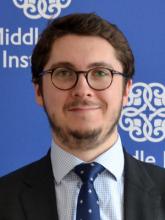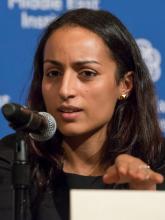In this week's Monday Briefing, MEI experts Randa Slim, Charles Lister, and Mabrouka M'Barek provide analysis on the progress of ongoing negotiations over peace in Syria, rising tensions in Idlib province between Hay'at Tahrir al-Sham and Ahrar al-Sham, and Tunisia's lobbying efforts to ensure continued U.S. aid.
Multiple Syrian Peace Talks Stuck in their Tracks
Randa Slim, Director of the Initiative for Track II Dialogues
In their fifth round of the Astana talks, Russia, Turkey and Iran disagreed on the make-up of the monitoring force in some of the four de-escalation zones agreed-upon earlier, its mandate and on confidence-building measures such as detainee release. An expert-level group set up by the three guarantor countries will meet this week in Tehran to iron out these differences.
Meanwhile, American and Russian diplomats and military personnel—with the involvement of Jordanian and Israeli officials—have been negotiating for months the terms and geographical contours of a cease-fire setup in southwest Syria. The major objective of these negotiations is to ensure Jordan and Israel a strategic depth free of Iranian forces and their affiliated militias. The hope is that if such a setup were to succeed, it will provide a cease-fire formula that could be replicated in other parts of Syria. Setting aside the issue of whether this cease-fire takes hold or not, the localization of conflict in Syria makes it increasingly difficult for a de-escalation process that works in Daraa and Quneitra to work as well in Homs, Idlib or Afrin.
The seventh round of the Geneva political negotiations also starts this week, despite their poor record of achievements to-date. They will address the same old four baskets of governance, a new constitution, elections and the fight against terrorism. The Geneva process is kept on life support not for its potential to produce a long-desired political solution, but for the lack of political will in the international community to agree on another negotiation framework if this process were to be pronounced dead.
And these tracks will continue advocating for a political solution in Syria while the Syrian regime, Iran and their allied militias proceed with their land grab.
Tensions Rise in Idlib
Charles Lister, Senior Fellow
In an unprecedented development, over 1,000 members of the al-Qaeda-linked group Hay’at Tahrir al-Sham (H.T.S.) launched coordinated raids across Syria’s northwestern Idlib province early on June 9, capturing 123 suspected Islamic State (ISIS) militants. Amongst those detained were several senior ISIS commanders, including a Russian identified as ISIS’ security chief in Idlib, Abu Sulayman al-Rusi. The raids resulted in the seizure of dozens of suicide bomb belts, improvised explosive devices (IEDs) and pistols equipped with silencers, as well as a large quantity of local and foreign currency.
It is no secret that ISIS has sought to infiltrate opposition-held Idlib since it was kicked out of the province in early-2014. Since mid-2016, suspected ISIS ‘sleeper cells’ have been blamed for dozens of assassinations and bombings in Idlib. A week ago, an ISIS suicide bomber attacked a school for orphans, while at least six IEDs have been discovered hidden in opposition figures’ vehicles.
The H.T.S. raids also came amid heightening tension between H.T.S. and Ahrar al-Sham, its former long-time ally. Ahrar al-Sham’s decision to hoist a huge Free Syrian Army (F.S.A.) flag at Idlib’s main border crossing with Turkey on June 7 aroused rapid H.T.S. condemnation. Two weeks earlier, Ahrar al-Sham’s leader Ali al-Omar issued a video address marking the Eid holiday, in which he stood for the first time alongside the F.S.A. flag and proclaimed the importance of Syrian unity. The Turkish government has also been secretly meeting with opposition groups based in Idlib regarding a possible limited intervention in Syria’s northwest, against the Kurdish Y.P.G. or H.T.S., or both.
Therefore, as large numbers of H.T.S. fighters mobilized late on June 8, Ahrar al-Sham leaders in Idlib warned of imminent H.T.S. attacks, and threatened ‘war’ should they do so.
Tunisian PM in Washington to Push for Military Aid
Mabrouka M'Barek, MEI Scholar
Tunisia’s head of government, Youssef Chahed, is in the United States this week for a three-day working visit in preparation of the second meeting of the U.S.-Tunisia Joint Economic Commission later this year. Chahed is due to meet with Vice President Mike Pence, as well as the secretaries of defense, treasury, and commerce as well as members of Congress.
Chahed’s visit will also include meetings with representatives of the World Bank and the I.M.F. The Tunisian delegation’s main objective is to influence the Trump administration to reverse their decision to decrease military aid to Tunisia. Compared to 2017, the 2018 budget plans a 61 percent decrease of aid totaling now $54.6 million, an all-time low since the Tunisian uprising of 2010-2011.
The Trump administration also inherits the former administration’s pledge to guarantee a loan of up to $1.5 billion to Tunisia on the international financial market. In attempting to appease the Trump administration, Chahed wrote in a recent op-ed that he was committed to restoring the pre-revolution neoliberal economic model of growth based on tourism, foreign direct investment, and exports.
Although this was the weak economic model that largely fueled the uprisings in 2011, Chahed’s thinking is that such a restoration will reassure the Trump administration that Tunisia will be able to pay its outstanding loans, without having the United States serve as a guarantor. Needless to say that Chahed's attempt to persuade the administration to provide aid on the moral ground that Tunisia stands as ‘an exceptional democratic experience’ will almost certainly fall on deaf ears.
The Middle East Institute (MEI) is an independent, non-partisan, non-for-profit, educational organization. It does not engage in advocacy and its scholars’ opinions are their own. MEI welcomes financial donations, but retains sole editorial control over its work and its publications reflect only the authors’ views. For a listing of MEI donors, please click here.















